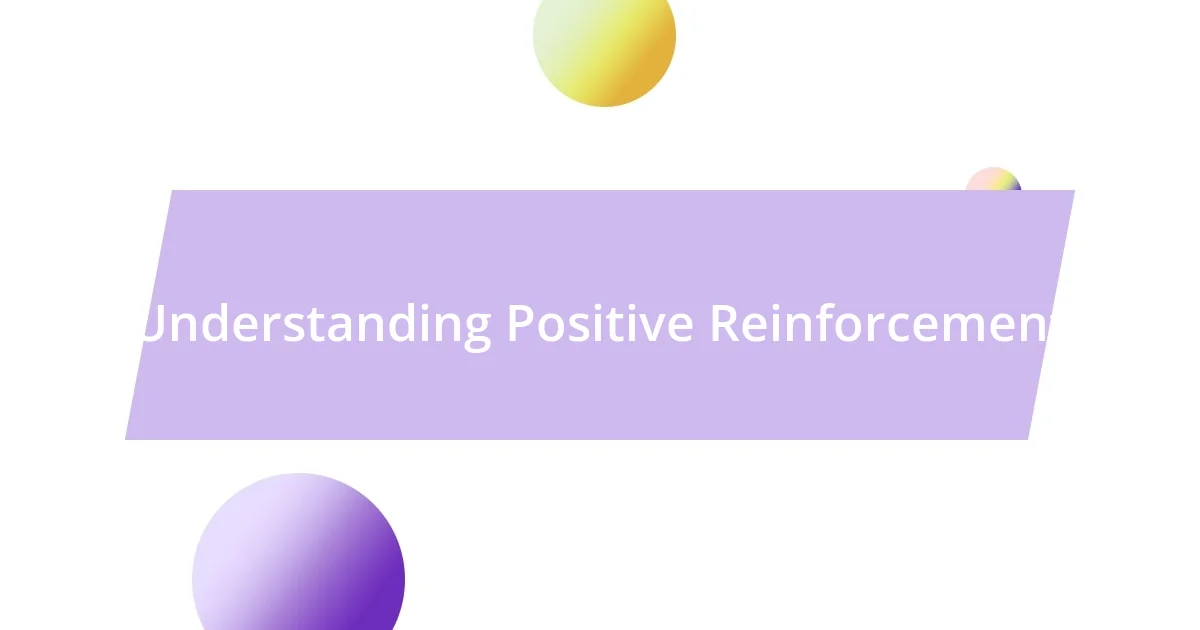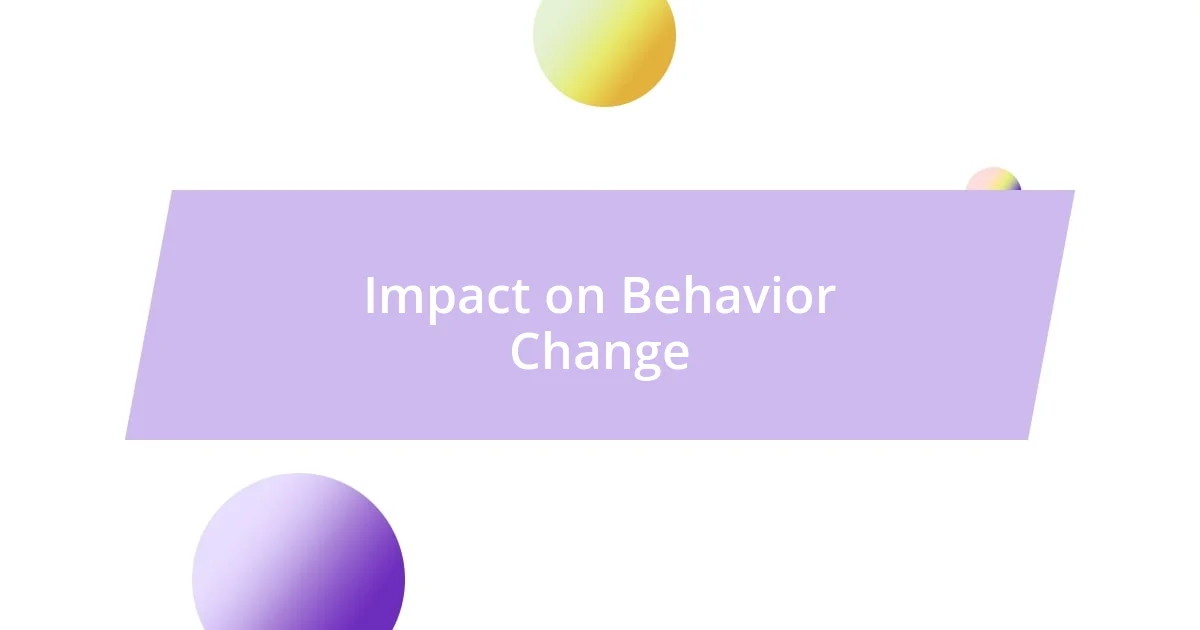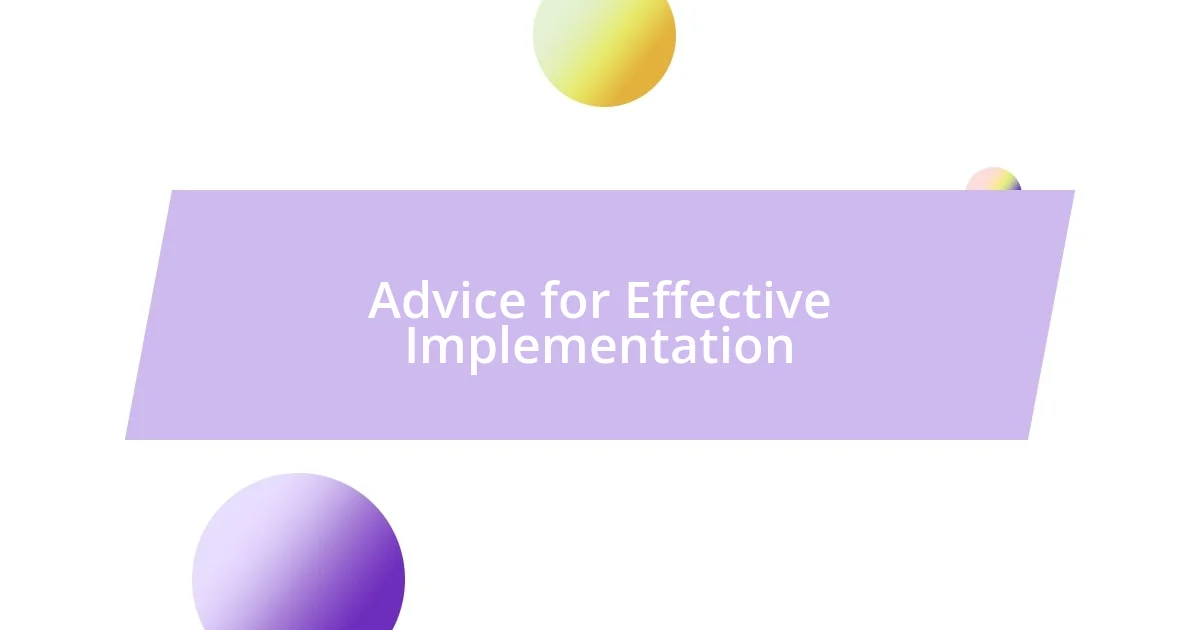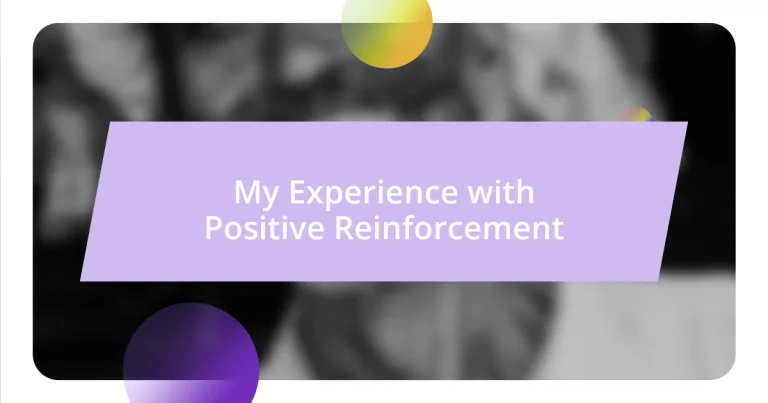Key takeaways:
- Positive reinforcement, such as small rewards and verbal affirmations, encourages desired behaviors and boosts motivation in various aspects of life.
- Implementing techniques like a success journal and social reinforcement enhances accountability and fosters a supportive environment for growth.
- Consistent reflection on achievements and personal rewards leads to sustained motivation and a deeper sense of accomplishment over time.

Understanding Positive Reinforcement
Positive reinforcement is essentially about encouraging desired behaviors by offering rewards or incentives. I remember training my puppy, and every time she sat on command, I would give her a treat and shower her with praise. Seeing her tail wag excitedly made me realize how powerful a simple reward can be; it created a bond of trust and enthusiasm.
Have you ever considered why we respond so well to positive reinforcement? I think it taps into our basic human desire for acknowledgment. For instance, in my workplace, I noticed that when my team received recognition for their hard work, their motivation surged. It felt amazing to witness how a few kind words could transform the atmosphere and inspire everyone around me.
It’s fascinating how positive reinforcement isn’t just effective in training animals or boosting workplace morale, but it also plays a pivotal role in our everyday lives. Reflecting on my friendships, I’ve found that praise and support foster deeper connections. I often ask myself, wouldn’t we all thrive more if we embraced this concept in all areas of life?

Defining My Personal Experience
Defining my experience with positive reinforcement brings to mind a time when I was learning to play the guitar. I vividly recall practicing for hours, feeling frustrated at times by my lack of progress. However, each time I nailed a chord or strummed a melody just right, my teacher would celebrate my small victories with genuine enthusiasm. That positive acknowledgment kept me motivated and eager to learn more.
Reflecting on this, I’ve recognized a few key takeaways from my journey with positive reinforcement:
– Small victories matter and should be celebrated.
– Recognition can drive motivation and create a willingness to improve.
– Constructive praise fosters a supportive learning environment.
– Personal appreciation often amplifies my commitment, whether in hobbies or professional endeavors.
By observing how such moments of encouragement impacted my journey, I truly understand the potency of positive reinforcement in shaping not only behaviors but fostering a rich passion for growth.

Techniques I Used Daily
When implementing positive reinforcement in my daily life, I often relied on small rewards to encourage ongoing engagement. For instance, I created a success journal where I noted down my achievements each day, no matter how minor they seemed. The simple act of reflecting on my accomplishments filled me with pride and motivated me to tackle challenges with renewed determination.
Another technique I found useful was verbal affirmation. Whenever I completed a task or reached a goal, I would take a moment to celebrate with self-affirmations. Speaking kind words to myself—like “You did great today!”—instilled a sense of achievement and reinforced the behaviors that led to my progress.
Moreover, I incorporated social reinforcement into my routine. Sharing my goals with friends and asking for their feedback created a supportive atmosphere where I felt accountable. Their compliments and encouragement acted as a fantastic motivator, reminding me that each step I took was noticed and appreciated.
| Technique | Description |
|---|---|
| Success Journal | Documenting daily achievements to reinforce positive behavior. |
| Verbal Affirmation | Using self-encouragement to celebrate personal accomplishments. |
| Social Reinforcement | Engaging friends for feedback and support to enhance motivation. |

Impact on Behavior Change
One memorable instance of behavior change occurred when I decided to reward myself with a favorite snack whenever I completed a challenging lesson in guitar practice. I found that this small treat was more than just a reward; it became a motivating factor that transformed my perspective towards practice. I often ask myself, “How can something as simple as food inspire improvement?” The answer lies in the connection between pleasure and accomplishment—it created a sense of anticipation that pushed me to strive for my goals.
I also noticed a remarkable shift when I began celebrating my achievements with friends. By inviting them to watch my progress, I was able to turn solo practice into a social event. Their enthusiastic reactions had a profound effect—not just on my confidence but on my desire to keep growing. Isn’t it fascinating how external validation can amplify our internal motivation? It’s a beautiful reminder that we’re not alone on our journeys, and sometimes, shared joy can spur us on to greatness.
As I reflect on my experiences, I recognize that small, consistent rewards have an extraordinary impact on behavior change. They don’t just serve to acknowledge success; they create a cycle of reinforcement that encourages ongoing improvement. Have you ever felt that rush of excitement after achieving a goal, no matter how small? Those moments are precious and can serve as a powerful catalyst for sustained effort in any area of life.

Challenges Faced Along the Way
Facing challenges while incorporating positive reinforcement into my life was an unexpected journey. One memorable hurdle was dealing with my own skepticism. I often found myself questioning the effectiveness of rewards—was a simple snack really enough to drive my commitment? Yet, through trial and error, I learned that these small tokens of appreciation truly had the power to uplift my spirits and encourage continued effort.
Another challenge arose from balancing reward systems with setting realistic expectations. There were days when my goals felt overwhelming, making it difficult to think of adequate rewards. I remember feeling disheartened at times, wondering if I was setting myself up for failure. Yet, I discovered that focusing on incremental progress—sometimes just the act of practicing for a few minutes—was worth celebrating in its own right, which reinforced the habit without overburdening myself.
Additionally, I encountered instances where external reinforcement from friends didn’t materialize as expected. Their initial excitement sometimes waned, leaving me to question my progress alone. I vividly remember a session where I completed a challenging song, but when I shared it, my friend seemed less enthusiastic than I hoped. This moment pushed me to realize that my self-worth should not be tied exclusively to others’ reactions. Do you ever find yourself relying too much on external validation? It’s a tough lesson but one that ultimately fostered a deeper sense of internal motivation within me.

Long Term Benefits Noticed
One long-term benefit I’ve noticed from using positive reinforcement is a sustained increase in my overall motivation. I recall a time when I faced a particularly long stretch of lessons that felt tedious. Instead of dreading practice, I’d tell myself that a delicious slice of cake awaited me afterward. The anticipation turned those monotonous sessions into something I actually looked forward to. Isn’t it amazing how something as simple as a treat can revitalize your commitment?
Additionally, I found that the positive reinforcement I experienced extended beyond my guitar practices. After celebrating small achievements at home, I noticed an uptick in my determination across areas of my life. For instance, finishing a book became a goal I eagerly tackled, knowing I could reward myself with a day out at my favorite café. Have you ever drawn motivation from unexpected places? For me, these moments became a continual chain of encouragement, impacting aspects of my life I hadn’t previously thought connected.
Over time, these rewards have fostered a genuine sense of accomplishment that I carry with me. The internal dialogue shifted from “Can I do this?” to “What will I achieve next?” I remember one particular milestone—mastering a challenging piece—where I treated myself not just with a snack but with a planned visit to a local concert. The experience not only celebrated my effort but also deepened my passion for music. Do you see how intertwining rewards with progress can unlock newfound enthusiasm for personal pursuits? This approach has truly enriched my journey.

Advice for Effective Implementation
To effectively implement positive reinforcement, it’s essential to tailor your rewards to what truly resonates with you. I remember trying out a variety of rewards, from stickers to extra screen time, before I found that simply allowing myself a cozy night with my favorite series did the trick. What I learned is that the reward should feel special to you; otherwise, it may lose its significance as a motivator.
Consistency is another key element in this process. I started small, rewarding myself after each practice session rather than waiting for a big milestone. This approach shaped my habits steadily, like planting seeds that would eventually bloom. Have you ever noticed how regular reinforcement can change your perspective on tasks? I found that celebrating my daily wins made even the most mundane tasks feel gratifying, transforming my routine into something I looked forward to.
Lastly, don’t overlook the importance of self-reflection after implementing your rewards. There was a time when I would simply move on to the next task without taking a moment to appreciate my progress. This oversight made each reward feel a bit empty. Now, I take a moment to acknowledge not just the achievement, but also how far I’ve come. I encourage you to ask yourself: How does reflecting on my rewards deepen my commitment? I truly believe that such introspection enriches the entire experience of positive reinforcement.














